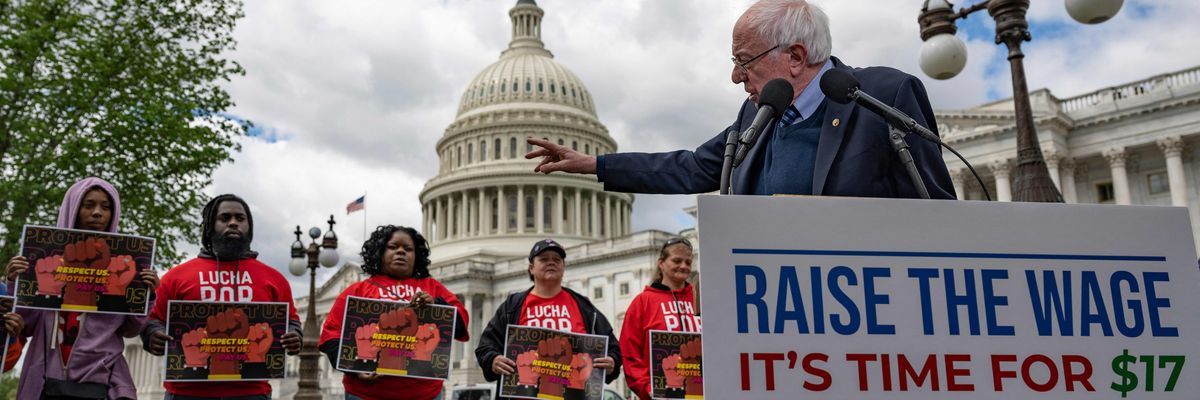The more of this language we use, the more likely it is that we will see immigrants as the “other” to justify cruel immigration policies.

Venezuelan and Nicaraguan migrants are transferred by agents of the Border Patrol after crossing the Rio Grande river from Ciudad Juarez, Chihuahua state, Mexico to El Paso, Texas, US to ask for political asylum on December 27, 2022.
(Photo: Herika Martinez/AFP via Getty Images)
DANIELLA PRIESHOFF
May 07, 2023
Last year, my client Susan called me to discuss her immigration case.
During our conversation she referenced the news that immigrants were being bused from the southern border to cities in the North, often under false promises, only to be left stranded in an unknown city.
In confusion and fear, Susan asked me: “Why do they hate us so much?”
While I couldn’t answer Susan’s question, her underlying concern highlights a startling escalation of public aggression against migrants over the past year.
Many outlets describe recent migration through the Americas as a “flood,” “influx,” “wave,” or “surge”—language that reinforces the notion that migration is akin to an imminent, uncontrollable, and destructive natural disaster.
There seems to be a growing “us” versus “them” mentality towards immigrants. This divisive language serves no purpose other than to divide our country, undermine the legal right to seek asylum in the United States, and cultivate a fear of the most vulnerable.
A clear example is showcased in recent media coverage of northbound migration across the U.S.-Mexico border. Many outlets describe recent migration through the Americas as a “flood,” “influx,” “wave,” or “surge”—language that reinforces the notion that migration is akin to an imminent, uncontrollable, and destructive natural disaster.
These descriptions are accompanied by sensational photographs and videos of long lines of brown and Black immigrants wading across the Rio Grande, crowding along the border wall, or boarding Customs and Border Patrol (CBP) vehicles to be transported to detention.
Woven into this framing is the near-constant use of the term “illegal” or “unlawful” to describe unauthorized crossings. As an advocate for immigrant survivors of domestic violence, sexual violence, and trafficking, I’m alarmed by the use of this language to describe a migrant’s attempt to survive.
Moreover, it’s often simply incorrect. A noncitizen who has a well-founded fear of persecution in the country from which they’ve fled has a legal right—protected under both U.S. and international law—to enter the United States to seek asylum.
When mainstream media wield the term “illegal” as though it were synonymous with “unauthorized,” they misinform readers and falsely paint asylum seekers as criminals.
Worse still, they encourage politicians who call immigrants themselves “illegals,” a deeply dehumanizing term. And the more dehumanizing language we use, the more likely it is that we will see immigrants as the “other” to justify cruel immigration policies.
We must retire the use of this inflammatory rhetoric, which distracts from real solutions that would actually serve survivors arriving at our borders.
Migrants expelled back to their home countries are at grave risk of severe harm or death at the hands of their persecutors. Those forced to remain in Mexico as they await entry to the United States are increasingly vulnerable to organized crime or abusive and dangerous conditions in detention.
And those who have no choice but to desperately navigate dangerous routes to the United States to avoid apprehension are increasingly dying by dehydration, falling from cliffs, and drowning in rivers.
The words we use in everyday discourse mean something—they can spell out life or death for those among us who are most vulnerable to abuse and exploitation. Now more than ever, I’d urge the public and the media to retire the use of sensationalizing, stigmatizing, and misleading imagery and rhetoric surrounding immigration.
Now is the time to apply accuracy and humanity in our depictions of migrants. Let’s not repeat the errors of our past.
This work is licensed under a Creative Commons Attribution-Share Alike 3.0 License.
DANIELLA PRIESHOFF is a Senior Supervising Attorney at the Tahirih Justice Center, a nonprofit that supports immigrant survivors of gender-based violence. She thanks Phoebe Quinteros for her contributions to the research for this piece.
Full Bio >







